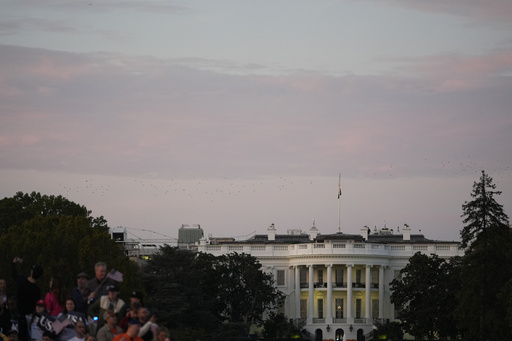
After Election Day, there will be a 77-day interval before the inauguration, during which the elected president will have the opportunity to prepare their administration to assume power from President Joe Biden.
Traditionally rooted in consensus and bipartisanship, the presidential transition became a contentious issue four years ago when then-President Donald Trump made unfounded allegations to contest his electoral defeat, and his administration delayed the transition initiation by several weeks.
To address such issues, a new law has been established to expedite the transition process, regardless of the electoral outcome. If neither of the major party candidates concedes following Election Day, the newly revised rules grant both sides access to additional government resources and logistical support, potentially resulting in Vice President Kamala Harris and Trump each assembling rival transition teams for an extended period.
“While regulations can guide actions, they ultimately rely on participants within the system to pursue a common goal,” remarked Max Stier, the president and CEO of the nonprofit Partnership for Public Service, known for assisting candidates and incumbents during transitions. “A successful transfer of power hinges on mutual cooperation that cannot be solely dictated by law.”
The situation from 2020 serves as a cautionary tale. Donald Trump’s false claims regarding widespread voter fraud resulted in postponing the transition’s launch from November 3 until November 23. The Trump-appointed head of the General Services Administration (GSA), Emily Murphy, reflected on the transition law from 1963 and decided she lacked the legal authority to declare a victor and facilitate the transition to a Biden administration while Trump challenged the results in court.
The GSA’s role is akin to that of the federal government’s landlord; only after key states’ votes were certified did Murphy formally recognize Biden as the president-elect and initiate transition processes. Trump eventually signaled on social media that his administration would be cooperative.
This time, however, things are different. The Presidential Transition Improvement Act enacted in December 2022 mandates that the transition process commence five days following the election, even in situations where neither candidate has conceded.
This amendment aims to prevent extensive setbacks, asserting that “an ‘affirmative ascertainment’ by the GSA is not a prerequisite for gaining access to transition support services,” as per the agency’s guidelines on the new legislation.
Moreover, this law ensures that federal assistance and cooperation are available for both candidates during transition preparations until “significant legal challenges” that may influence election outcomes have been largely settled, or until electors convene in December to formally select an Electoral College winner.
As a result, there is potential for both sides to receive sufficient support to establish an administration up until mid-December—approximately one month prior to Inauguration Day on January 20.
Derek Muller, a legal expert on presidential transitions from the University of Notre Dame, noted this law secures backing for both candidates’ transitions, ultimately leading to one side bowing out. This shift is superior to the previously encountered scenario where neither candidate received transition support, which can lead to significant delays and national security vulnerabilities. “In the past, it was neither candidate gets the funding. Now it’s both,” Muller stated.
He referenced the disputed 2000 election, during which the GSA only recognized a winner once the Florida recount was resolved on December 13. This delay raised concerns about national security readiness, ultimately contributing to the U.S. being underprepared for the September 11 attacks that followed.
“While the transition period could extend into mid-December, which poses certain risks, it is a manageable risk,” Muller acknowledged, emphasizing that even a mid-December timeline provides crucial certainty.
Currently, Trump still perpetuates the false narrative that he won the 2020 election, declaring he would only accept the results this November if deemed fair, which raises concerns about how he might respond, especially if he does not emerge victorious—thus testing the newly implemented law.
As both camps gear up for the potential transition, a vast process rests on filling approximately 4,000 government positions with political appointees chosen by the president-elect’s team, typically beginning with critical Cabinet roles.
Harris’ team has already reached an agreement with the Biden administration to utilize government office space in Washington and access other resources while vetting candidates for important national security positions.
Conversely, Trump’s team has not formalized any transition agreements, missing crucial deadlines to coordinate with the GSA regarding essential logistics such as office accommodations and technological support, as well as access to necessary documents and personnel from the White House.
Stier also mentioned that the Trump administration’s inconsistency with the transition process began in 2016 when the then-president-elect dismissed his transition coordinator, Chris Christie, leading to significant staffing delays during his early presidency.
He emphasized that establishing agreements to facilitate the transition is merely the starting point; the overall transition process requires an in-depth understanding of government operations and a commitment to executing a smooth transfer of power.
As for what the transition might resemble this year, both sides will not begin entirely from scratch; Harris is likely to draw on some personnel from the Biden administration due to her previous role as vice president.
On the other hand, Trump could also assemble a new team but has already demonstrated his capability to form an entirely new administration before in 2017.
Harris has expressed intentions to appoint a Republican to her cabinet, with former Wyoming Representative Liz Cheney being a notable candidate due to her previous GOP leadership and her collaboration with Harris during her campaign.
Trump has hinted at appointing former independent presidential candidate and anti-vaccine advocate Robert Kennedy Jr. to address health issues, while proposing South African-born entrepreneur Elon Musk for a cost-cutting secretary position.
Regardless of how the election plays out, John Kirby, Biden’s national security spokesperson, assured that the current administration is committed to facilitating a proper transition.
